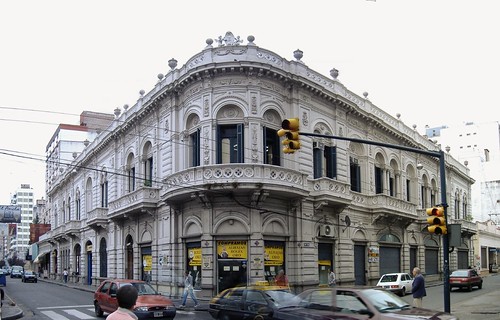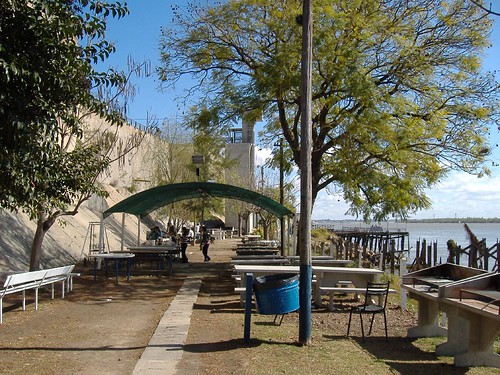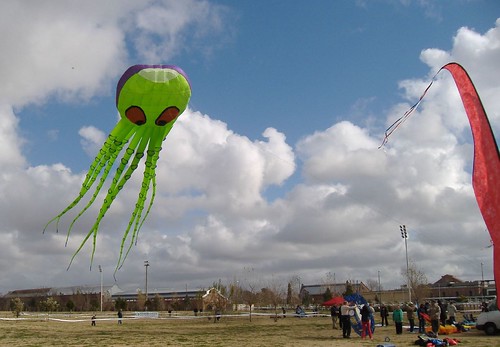If you remember, yesterday I was talking about a conversation I had with a friend, about language. The same day, after that, I also got to talk with a friend about the poverty of language, specifically in religious discourse. It was quite an interesting chat, so I thought I could share some of it.
My friend has the perception that evangelical preachers (in Argentina, and especially TV and radio preachers) have lowered the level of discourse to a crude minimum, and people sadly respond to it because they, too, have had their vocabularies shrunk, and their thought (and their ability for abstraction) as well. What he means is, you turn on the radio or the TV and you find pastors basically selling Jesus as a miracle product, or preying on the vulnerable without any kind of subtlety. We're talking of "ARE YOU IN PAIN? COME TO JESUS AND HEAL!" in big block letters across the screen, literally or figuratively.
My own contention is that the preachers are giving the people exactly what they want (a wind-up machine called Jesus who provides you with money and health and a comfortable house once you know the magic words) and that people might have a smaller vocabulary but do not necessarily have less ability to think and reason; that is, the preacher's speech is so plain, and so lacking in spirituality, and so incoherent at times, that you only need a basic command of language to see through the scam. That is, I don't believe that exposure to grossly simplistic religious language can be used to bring down your ability to think about deep spiritual matters, unless of course you accept that degraded language on your own volition and then become accustomed to it, which is what most people do.
On the other hand, my friend said, Catholic priests were still using "higher" language at times: less concrete, more superficially spiritual, possibly popular but not vulgar. I contended this was as bad as the evangelicals, only more weaselly. "Jesus will give you financial stability if you receive him and praise him in the assembly" is straightforward; "God takes care of all His children" is almost completely empty, although being empty it allows for the hearer to fill it with meaning, and is only useful for the hearer once completed with the warning that, in order to be a good child of God, you must go to church every Sunday.
I had the feeling that my friend was either not conveying his ideas wholly, or he lacked experience in a Catholic community, because if you've had that you know that most people in church are just there to gossip about their neighbours, and not to hear the priest using spiritual or abstract language. Moreover, they'd go straight to the evangelical preacher if they weren't culturally accustomed to being Catholics in an overwhelmingly Catholic country.
The real difference between those sects is the level of commitment they require. In order to be a Catholic you have to do... well, nothing. If you want to be an active Catholic, you're only required to attend church and sit there. It's all a social community experience, no more. You may get something spiritual out of the priest's rambling, but you can safely ignore it and believe yourself to be OK most of the time. Catholic spirituality is based on suffering, self-abasement and mortification, but understandably they don't insist on those things too much; they remain safely in the abstract plane. On the other hand, evangelicals (in line with Weber's analysis of protestantism, I believe) see suffering and poverty as an indication that you're doing something wrong, and so try to correct it, actively. They call on you and insist that you have to turn around your life, through the use of Jesus, and if you dare tell them that you're fine, they tell you, emphatically, that you're not. You're filthy. You're addicted to money, sex, Internet porn, alcohol, dancing and parties, and all sorts of foul social intercourse with the unsaved — mundane stuff that you've got to get rid of.
The Evangelicals are proactive — they're in the minority and they need to make you suffer so they can save you. They'll dig up whatever is rotting inside you and show it to you, and describe the feeling and the smell graphically to you. The Catholics are in the majority, and they'd rather keep their ninety-nine sheep happily in the fold than go out of their way to look for the missing hundredth. They do the sensible thing, as expected from an old well-established sect. I can't guess what will happen to those two.
My friend is actually preparing a thesis about the exercise of power through language, and this is part of it, so I'll keep you updated.
21 September 2007
Catholics and evangelicals and the power of words
20 September 2007
Languages: doin' it as they do in the Discovery Channel
I was chatting with someone from the U.S. the other day about an assortment of topics, and the evolution of language came up. This is one of my favourites, as many people know. We discussed how the younger members of our societies seem to be losing certain finer distinctions of language, how this makes us (both in Spanish and English) feel we're experiencing a kind of degradation of our respective languages, and how this is, after all, a natural and even desirable consequence of change.
We both had a problem, truth be told, with young Americans using the past tense instead of the past participle and saying for example "I had went" (gasp!), as well as forgetting there's a subjunctive mood, and with Argentine teens (and so-called professional journalists) using the conditional/potential mood in place of the subjunctive in conditional clauses ("Si lo sabría te lo diría" instead of "Si lo supiera te lo diría").
One of the myths of language is that of purity. And it's a dangerous myth, like any ideal involving purity or perfection, especially when in reality they're nowhere to be found. If there were such a thing as "pure" in language, there would be no Spanish or English. Spanish has a ton of words from Latin, of course, but it's not Latin — the original words have been mangled, lost, redefined, their sounds changed and merged into other or split into different sounds, the grammar being greatly simplified, the vocabulary supplemented by thousands of foreign elements.
There's a sizable contribution from Arabic in there too, from alcohol and azúcar (sugar) to café and zanahoria (carrot), and Germanic words from the time when the Visigoths took over, and words from French, English, Basque, and many Native American languages from Nahuatl in Mexico to Quechua in the former Inca territories and Guaraní along the littoral of the Paraná and Uruguay rivers, and of course technical terms reborrowed from Latin and Greek (often recognizable in many other languages). English, well, you know about English. So if you listen to some purist claiming he or she speaks "the good ol' language" and chiding the youngsters for polluting it with foreign words and degrading it with neological grammar, you know that's all ridiculous.
I had an interesting conversation with another friend later, also about language, but in a philosophical/religious setting. I'll tell you about that tomorrow.
19 September 2007
Haunted swing not haunted that we know of
The news today: remember the "haunted swing" in the city of Firmat? The swing that swung itself? Well, a group of qualified professionals from Buenos Aires, called Visión Ovni (yes, that means "UFO Vision"), after intensive field research, has concluded that the swing does not move due to any known physical force. That means, they explain, that there are no measurable electromagnetic fields or alterations thereof, and the swing is made of normal material, the ground under it is just the same as in the rest of the neighbourhood, the wind is not doing it, etc. It doesn't mean, they remark, that there's a paranormal phenomenon involved.
I wouldn't really trust a group of people with a name like that to do scientifically serious research of anything, but at least they seem to be honest and to the point: they've found nothing. Of course, the twisted little minds of the paranormal freaks will turn that innocuous statement into "This is something outside the purview of science and of normal human experience! We were right! Let us dance and praise the Beings of Light from the fifth dimension!". Or something like that.
Again you'll have to forgive me for not writing more... not that I feel really guilty or anything. I've been putting my effort (including the collection and commentary of outrageous news) into my website. I reckon that it may become what I want, structure-wise, in a couple of weeks. Much of the difficulty lies in making the structure solid and the support mechanisms behind it as automatic as possible, so that I can care about content and forget about the little quirks of HTML and CSS. Not to mention the major quirks of PHP and the sometimes mysteriously erratic behaviour of MySQL.
In case you didn't know, my website can be reached also by an alias domain — just spell out the names of my initials (in Spanish) and add the top-level components. If it were in English, you would just go to PeeDeeEff.com.ar, for example. Again I ask, let me play my little game.
17 September 2007
Bye bye cheap credit
The weather last weekend continued to be horrible for anything beside staying home with a mug of hot chocolate (or a hot... well, you can imagine). It drizzled almost the whole time, and gusts of chilly wind blew away what had seemed like a prelude of a nice spring. I had dinner with friends on Saturday, then went out, and miraculously I didn't catch a cold.
The news, today, is the economy. You know that the real estate bubble in the United States has finally burst. As a result, the international markets went crazy and have been coming down for some time. Interest rates have soared, and financial investment options have become riskier. The problem in the particular case of underdeveloped countries ("emergent economies", they call us) is that what we offer in terms of financial investment (i. e. our debt bonds, the equivalent of Treasury letters and such) is rather risky to begin with. And there's this tiny stain in our payment records from the time when we defaulted on US$93 billion and paid back a quarter of the original debt years past due... So everywhere people are getting rid of Argentine bonds as if they were flaming potatoes, and it's more difficult to get loan money, and interest rates are climbing here as well.
This kind of thing goes unnoticed often, but not now. To the common citizen, the result which is already apparent is that we won't be able to buy so many things on cheap credit. Since the economy stabilized a bit, it became customary for department stores and shopping chains to offer goods cheap and expensive in installments with little or no extra charge. Many offered their own credit cards. It came to the point where buying a fridge or a computer in 12 monthly installments with the store's private card was actually cheaper than buying it in one payment, even in cash. In other cases the interest was simply insignificant. But that, we're told, is no more.
I personally haven't done any large purchases lately, and whenever I can avoid it, I pay up front with my debit card or in cash (if you pay with the debit card, the government returns 5% of the VAT-free net price to you the following month). So the news doesn't worry me. But I'm moving out one day, and that may be sooner than expected, say, at the beginning of next year. I'll suddenly need (at the very least) a fridge, a stove, and some furniture beyond a table and a chair (my bed I'll take with me!). So maybe I should be concerned... Damn the butterfly effect in economics!
15 September 2007
Photographers' plague reloaded
 I'm just back from a meeting (somebody pompously termed it an assembly) of the Rosarigasinos photographer group (the ones I went to Granadero Baigorria with, and to the boat tour before that).
I'm just back from a meeting (somebody pompously termed it an assembly) of the Rosarigasinos photographer group (the ones I went to Granadero Baigorria with, and to the boat tour before that).
We've been planning to hold a modest joint exhibition (only 3 pictures per person), and today we wrapped up most of the issues. It'll be held on the 1st and 2nd floors of the Faculty of Biochemistry of the National University of Rosario, which lends the space at no cost to such things, starting on October 8. Matte paper, 15×21 cm, mounted on 3 mm high-impact plastic sheet. The topic is the city, and the name is Mirada Rosarigasina. Not that this advertising will get through to many, but I do what I can.
(I could do some more advertising in the relevant place in my new website, the one you don't know where it is yet, even after I told you specifically to join my three initials —which are the same as the name of a Popular Document Format— with hyphens and add .com.ar.)
After the meeting I had to run to Japanese school to write a composition for a contest. You get dictionaries, a couple of sheets of paper divided into 300 large squares (one per character), and 2 hours to write about some topic. They give you 2 topics to choose from, on the spot. I wrote about "current trends", mentioning the widespread use of mobile phones and computers, the poverty and rudeness of the young generations' language, and the fact that, fortunately, some customs, such as grabbing a quick cup of coffee with a friend, never get out of fashion.
I was relaxed given the occasion — last year I was terribly nervous and made a lot of mistakes, but this time I simply let it flow out without caring too much about using complicated expressions. Better being correct and sound just a bit simple than using a lot of learned words and get them wrong (and let me tell you, Japanese is an irresistible tempter in this regard — for every simple, common concept, the formal register has two or three obscure equivalents that you can misuse horribly without even noticing).
So I wrote, I gave it to my sensei, and now she's sending it to Kyoren in Buenos Aires to be graded. I don't think I'll win a prize, but I came out satisfied with I'd written, so I don't care.
Labels: gatherings, japanese, photography, rosarigasinos, websites
14 September 2007
Catholic bastards
I won't make an apology for the title to any Catholics out there — if the shoe fits, wear it, as the saying goes. I'm as mad as I'm sad to write again about this. Another mentally handicapped girl raped, once more the bigotry, the religious fanatism and the hypocritical despise for life of a few people in power keeping that poor girl from having a safe abortion. I wrote about abortion in Argentina once, of the stories of some girls who went through the same horror, and several other times, about why this seems not to change, ever.
A very poor 19-year-old girl in Entre Ríos, with a severe mental disability, is carrying a baby. She was raped and, through the person in charge of her care, in this case her mother, she's entitled to request an abortion, which must be done without any delays, for free, in any public hospital. But the doctors didn't want to do it, the hospital delayed the procedure, and then the inevitable: like so many other times before, some Catholic freak in the hospital staff calls some fanatic Catholic judge or whoever, and gets an injunction, a ban, or, as in this case, decides to put the unborn child under judicial custody, as if it were a minor in a risky environment.
After another court order cancelled the fetus's custody transfer, the father of the girl, who for 16 years hasn't bothered to support his many sons and daughters or even go to check them every once in a while, suddenly popped up out of nowhere and, with a devout Catholic lawyer on his back, he demanded to have custody of his daughter and stop the abortion. The father is not a wealthy man, but now he has the Catholic Church on his side (the lawyer is a well-known militant member of a Catholic lay order), and together they'll do anything to deprive the girl from his right to rid herself of the fetus, or at least, to delay the procedure as much as possible, until it's too late. They'll promise (they have promised) they'll take care of everything. Such a thing has never happened, that I know.
Mind you, you can be pro-choice or against-choice (the self-righteous "pro-life" title I won't grant you), but this is the girl's right. It's clearly, unmistakably, concisely written in the damn Argentine Penal Code, under Article 86. It's been there for ages. The framers of the Code were probably very Christian and God-fearing, but they saw that forcing a woman with a mental disability to carry a fetus to term and then raise it was cruel beyond measure, and was sure to mean horrible suffering for both. This girl has the right, and the state, through the management of the public hospital that serves the area, has the legal obligation to terminate the pregnancy. Everyone trying to block the abortion (the lawyers, the judges, the doctors, the political administration of the hospital, everyone) is acting against the law.
So how come they're not challenged? How do they get away with this? Beats me. Justice is slow and corrupt, yes, but it does come some times. Will those lawyers and judges, who value their own religious prejudices over the law and even over basic human compassion, be judged some day in turn?
13 September 2007
Dubious honour
Yay! Rosario is, once again, Argentina's Capital of Unemployment. This title was first, informally, applied to the city during the Age of the Rat, even while most of the country (including Rosario) was busy enjoying the benefit of an economic model based on wishful thinking. The situation is much improved today — only a few tens of thousands of us are on the brink of starvation, and most of those who were hopelessly unemployed back in the 1990s are now happy exploited workers in fields ranging from the typical McJobs to construction works.
The city has 11.2% of its economically active population unemployed, that is, looking for work and not finding it. No other large town or city has a number so high. The wealth that you see in the streets (shiny new shops, luxury apartment towers) is real, but a lot of it comes from without, from the countryside, enriched by the exports of cereal, soybean and vegetable oils. Sadly, the production of such items is very mechanized and doesn't give jobs to many people.
We shouldn't worry about keeping this title for long, though. You can bet INDEK won't let that happen!
12 September 2007
Website incognito
My website (the one I'm not officially naming here) is up, and though still empty, some sections are already open and being filled in with actual content. Initially, I tried a CMS (content manager system) to organize it all in a standardized fashion with a minimum of coding, but I'm an old-fashioned geek and I missed the freedom that comes with writing your own HTML. Throw in a lot of PHP (chaotically written and rewritten), and I'm in heaven, although (or because?) it all takes four times longer to get done. But the result is exactly as I want, not as the programmers of PHP-Nuke, Joomla! or XOOPS would feel like.
As I said before, I'm trying to stay anonymous for a while, and pointing you directly to the site would defeat the purpose, but you could try some things to find it, such as — I don't know — joining my initials with hyphens, to begin with. (OK, that was silly, but let me play my little game.)
The weather's awful again, so I don't think I'll be able to go jogging this week. Argh! I was about to go yesterday, because at noon the sun had come out; I took a nap and when I woke up it looked like the sky was going to fall down. And I felt more tired than before the nap, though that must've had to do with the atmospheric pressure and the heat. So I stayed, and then it didn't rain at all. Today the sky looks even scarier, but I think I'm going to try a short run (I foresee that I will get soaked and catch a cold).
No luck for the photographer, either. With the website taking up my time, and the weather so menacing, I haven't been out there with the camera, seriously, for a week. Last Sunday I was invited to go on a photo safari to the south of the city, but I went out the night before and that killed the plan. I'm told it went very well. There's a whole sector of the city that I don't know — with old mansions surviving along certain avenues, dating back from better times (when in Rosario la Zona Sur wasn't yet a synonym of No-Man's-Land), and a huge park on the municipal border. Well, that won't go anywhere anytime soon.
This blog will resume its usual boring news mode in a few days. Be patient!
10 September 2007
My news
If you're wondering why I haven't been blogging lately, the answer is: I've been doing other things. First of all, and most importantly, I got myself a website (a real, personal website, with a domain name and all). It's still quite empty, and I'm not revealing here where it is, since I'm trying to keep a low profile on that. I'll be dealing with sensitive topics (religion, politics — the kind of thing that ruins dinner tables when brought up) and I don't want to be immediately associated to them. You might say this is already what I'm doing here, but this is just a small blog hosted by a free provider, in a language that effectively isolates me from my everyday environment. My bosses and most of my acquaintances don't read this blog.
I've wanted a website for some time, and I wasn't really doing anything about it because I was busy with my blogs, and because I thought it would be expensive. Not prohibitively expensive, but then I'm not going to make money out of it. However, I was under a wrong impression. Web hosting, today, is available at a ridiculously low cost and with reasonable quality even in Argentina. And if you're content with a .com.ar domain, there are no additional costs.
Anyone with a minimum of imagination will be able to guess my identity from my website. Just going to nic.ar should suffice. (If you can't pick up that hint, well...)
Another reason why I haven't blogged as of late is that I started jogging again. The weather has been warm and wet, not a pleasure, but better than the cold, for me. So several afternoons I could've used for blogging were spent on jogging and stretching. I don't live really close to any suitable jogging circuits, so I have to spend some time going to and returning from it.
And finally, as I promised in my last post, I don't want to bore my readers to death with more politics, and since politics is all over the news these days... I'll do a summary of that soon.
05 September 2007
Santa Fe, Córdoba, Misiones
(I'll stop the politics after this. Promise.)
The election was Sunday, today's only Wednesday, and everything already seems to be upside down. Some people who were overconfident to the point of hubris are desolate. The parachuted former candidate Rafael Bielsa is going to resign from his deputy chair because "it wouldn't be ethical to represent the city of BA after I was candidate for governor of SF" (what, you mean now?). Governor elect Hermes Binner met with governor Obeid in the government house and the employees left their posts to go and greet him. The factions of Peronism in Santa Fe are at each other's throats, as they see their power structure crumbling like a house of cards. The President hasn't uttered the words "Santa Fe" (or "Córdoba") since Sunday.
And Binner is already laying out his plans, which include giving more money and more power to the municipalities, avoiding the discretional management of funds by the central provincial state, fighting tax evasion without raising taxes, ensuring that school classes start on schedule next year, and cancelling the construction of a new provincial hospital only 10 blocks away from a municipal hospital (a project that vice-governor, councilmember elect and well-connected architect María Eugenia Bielsa made up and is now defending with such foamy rage that it seems rather obvious she was going to make dirty money for herself out of it).
The situation in Córdoba after the election is a mess. Only 17,000 votes (out of more than 1.5 million valid votes) separate the two main candidates. The vote count was abnormally slow, the handling of the information was horrible, and the fraud is obvious; the only issue is whether it was a general effort, planned from the top down, or just minor tricks on the local scale (the latter are a certainty).
And, thanks to the Ley de Lemas, the elections in Misiones next Sunday will most likely be even messier: besides the board-kicking effect caused by the rejection of the constitutional reform allowing the governor's re-election, the Ley de Lemas, which allows parties to combine the votes of any number of minuscule factions and candidates, means 18,000 candidates will be running for something — one every 36 voters.
Anyway, we're done over here for now. There have been many interviews and articles about Binner's achievement, and in most of them one can realize that the media have caught the general vibe of the people and, besides the natural journalistic interest for "the first Socialist governor in history", there's a serene awareness that change for the better is coming. Nobody expects a lot, but then everybody expects something — even those who voted for Bielsa, who (for the most part, if you ask me) aren't so sure that they should be sad about the loss.
Labels: 2007 campaign, córdoba, election, hermes binner, ley de lemas, misiones, rafael bielsa, rosario, santa fe
03 September 2007
Election Sunday
 What a weekend! I'm into politics, but I was waiting for this election in particular for personal reasons. I'm an employee of the provincial state of Santa Fe, so the governor election meant the citizenship was ultimately going to elect my boss, and the outcome could radically change my working conditions.
What a weekend! I'm into politics, but I was waiting for this election in particular for personal reasons. I'm an employee of the provincial state of Santa Fe, so the governor election meant the citizenship was ultimately going to elect my boss, and the outcome could radically change my working conditions.
Well, the short version is: Hermes Binner won the election against the Rosario-born, porteño deputy Rafael Bielsa with a 10% overall difference. In Rosario, mayor Miguel Lifschitz was reelected, beating the repeatedly sold-out former Socialist mayor Héctor Cavallero by such a wide margin Cavallero didn't even bother to appear in public to protest.
The Front for Victory (Kirchner's version of the Justicialist Party) lost the governor election in great part thanks to Rosario's votes. It also took several surprising hits, losing its grip on several important cities that had been ruled by Peronists for years or decades, such as Santo Tomé (near the capital, pop. 60,000), San Lorenzo (30 km north of Rosario, pop. 45,000) and Villa Gobernador Gálvez (right south of Rosario, pop. 75,000). The biggest and quite possibly painful surprise was the provincial capital itself, where the Socialist Mario Barletta beat both the Front for Victory candidate Martín Balbarrey (seeking reelection) and the "dissident Peronist" Oscar Martínez. Starting in December, five of the seven largest cities in Santa Fe and more than half of the population will be ruled by Socialists.
Those were the objective numbers. Now the impressions... What I got from most people was simply relief, the comforting realization that a dynasty of mediocre opportunists was ending, the sudden awareness of this turn of events. Binner is the first Socialist governor in the history of Argentina, but it's obvious to everyone that he was voted by many people who wouldn't call themselves Socialist. Others don't like him very much, and many outside Rosario surely don't really know him at all, but voted against something: the crude inability of the Peronists to do anything but clinging to power (even as they fight among themselves for it), the aggressive language and derisive manners of a candidate that tried to pass for one of us when he hadn't set foot in the province for two decades, the plain realization that anything but a radical change would mean four more years of flat, uneventful decadence or, at most, vegetative growth. Four more years, after 24 years of corruption, of judges on the payroll of the party, of a police force stained with a string of unpunished crimes, of friends turned government officials who have no idea to do what they're supposed to do, of fundamental laws delayed and then passed and ignored, of callous indifference to the suffering of millions, of the State turned into a section of the Party. That was too much.
Another impression I got was that Rosario was the lever that moved the election. With almost one-third of the population of the province, the landslide victory in Rosario was important for the overall result, but I'm speaking of comparisons and imitations. People are not stupid. Rosario serves as proof that, while unable to work magic, a good administration can improve the citizens' quality of life a lot, even without help from the provincial state, and beyond the mere recovery of employment and consumption that follows automatically from a high economic cycle. Thus it shouldn't be surprising that the two largest cities in the Greater Rosario area changed hands last Sunday. San Lorenzo, an industrial port city, has an enormous untapped potential and a government that wasn't up to the challenge. Villa Gobernador Gálvez, next to Rosario, could not but watch with envy as the neighbouring metropolis flourished while a mafia government led directly or by proxy by a violent, uneducated thug continued to win elections. Last night, minutes before Rafael Bielsa spoke to acknowledge his defeat (which he took ages to do), a dozen of cars with people waving Socialist flags (red and white, with the fist and the rose in the center) raced along my street, throwing confetti and honking their horns. I went up the roof to wave at them. Bielsa spoke then, and rather predictably he assumed all the blame. He thanked all his political patrons, from the president down, for lending themselves to the campaign, but apparently forgetting the 360,000 citizens that voted for him. Well, at least he didn't imply the rest of us were stupid, like Filmus did in BA. Binner's speech came minutes later, after shorter admonitions by Lifschitz and by vice-governor elect Griselda Tessio. The guys with the flags were already in his headquarters at the Patio de la Madera. Binner spoke in measured tones, remembering historical characters of the parties of the Progressive Front, and attacking no-one directly; the young militants, though, booed governor Obeid's and president Kirchner's name when they came up (Binner was saying that both had politely called to congratulate him), and quite loudly told the Peronists to shove their purposefully biased pre-election surveys up their collective asses.
Last night, minutes before Rafael Bielsa spoke to acknowledge his defeat (which he took ages to do), a dozen of cars with people waving Socialist flags (red and white, with the fist and the rose in the center) raced along my street, throwing confetti and honking their horns. I went up the roof to wave at them. Bielsa spoke then, and rather predictably he assumed all the blame. He thanked all his political patrons, from the president down, for lending themselves to the campaign, but apparently forgetting the 360,000 citizens that voted for him. Well, at least he didn't imply the rest of us were stupid, like Filmus did in BA. Binner's speech came minutes later, after shorter admonitions by Lifschitz and by vice-governor elect Griselda Tessio. The guys with the flags were already in his headquarters at the Patio de la Madera. Binner spoke in measured tones, remembering historical characters of the parties of the Progressive Front, and attacking no-one directly; the young militants, though, booed governor Obeid's and president Kirchner's name when they came up (Binner was saying that both had politely called to congratulate him), and quite loudly told the Peronists to shove their purposefully biased pre-election surveys up their collective asses.
And then that was it. The numbers continued arriving, and as more data from the bigger cities were input in the system, the difference between Binner and Bielsa widened. It didn't matter anymore.
We now have three months to wait. Binner is meeting with Obeid today to talk about the transition. Obeid, I think, will listen, and won't do anything stupid. He's an old politician, and he's on his way out.
What can we expect? Well, first of all, autonomy for Rosario!
Media coverage in Spanish: La Capital, Página/12, Rosario/12, Rosario3, La Nación, Clarín; in English: CNN, Buenos Aires Herald
31 August 2007
The end is near

My Japanese calligraphy teacher's view of the candidates for the governor election: "There's the guy with all that beard... and the other guy who looks like Hitler." I had to laugh. It's very difficult to discuss politics in a language you're just starting to understand beyond the basics, and explaining Argentine and local politics to a foreigner from a vastly different culture is absolutely impossible. We left it at that. (Watanabe-sensei also inquired about Cristina Kirchner. I just said no.)
OK, that was just comic relief. We're right on top of the election, and that's a good thing, because I was getting tired of the incessant TV and radio ads, the childish taunts among grown men, the unsubtle campaign moves. If I hear the President is coming again to unveil yet another one of those hypothetical or half-finished public works that abound these days, I will lose it.
In case you didn't notice, I'm starting a news blog. I'm going to take news from local media and classify them with graphical labels according to their type... morbid, boring, useless filling, paid-for ads disguised as news, etc. It's en español and it's called Etiquetame todo ("Label Me All Over"). If you read Spanish, check out it.
30 August 2007
Photography tricks, part 1
I've taken photography up a notch as a passtime. It's not that I've gotten better at it, or that I'm going professional. I would like to get a DSLR camera and sophisticated gear (last Sunday we were joking about polarizers making you popular), but that would take a lot of money and I'd feel bound to turn photography into a job of some sort to compensate. I have no intention of doing that, since turning anything into a job kills the fun, for me at least. (That's besides the fact that I have other uses in mind for that money.) But I've learned some tricks, both in the field and once the pictures are already in the computer.
I wrote a post about digital photo manipulation some time ago. It concerned border enhancement (especially for buildings) through a process of detecting borders and overlaying them on the original image. Simple and powerful, if done subtly.
That was one of the first steps of the ongoing process of turning a careless point-and-shoot photographer into a semi-literate photo art producer. Again, I'm not turning into one of those self-overrated photographers who excrete string after string of "conceptual art" pictures who are just blobs of colour, or superb black-and-white renditions of garbage and old people's wrinkled faces. I just want my pictures to look nice (I was going to write "stunning", but that would be an exaggeration, and it most surely is a cliché).
Since these posts may sometime turn into a chronicle, and right now this could help someone, I want to document another step.
One of the things I didn't notice at some point (and I do now) is that the human eye can distinguish a lot more degrees of lighting than the camera can capture. Where you see a dark object inside a darker area within a pool of even darker shadows, the camera just sees a black mass. The subtle gradations of a bright cloud look pure white to the lens. Same for colour hues. This can't be helped except by technology and time. The lesson is that you should try to take advantage of all the capacity of your camera, and maximize the contrast — this, unless you're intentionally trying to produce a dull or blurry picture, of course. The image will only have 256 degrees of luminosity per colour channel (red, green, blue), which will give you only 256 degrees of value. You want to stretch those as much as possible.
Check out the tutorial on removing haze from gimpguru.org. This really blew my mind. It's a very easy process that can turn a picture alive.
The idea is simple. First, you don't have luminosity levels to spare, so if there are some dark pixels who look dark enough to you, and there's nothing darker than them in the rest of the picture, just call them black, make them really black, and drag the brighter colours along, making them proportionately darker. Then do the same to bright pixels: just make the brightest of them white, and make the rest brighter. The way you do this, in techspeak, is by clipping both ends of the value histogram of the picture, ignoring the extreme values with smaller frequencies.
If the picture includes a bright sky, the white end of the histogram will be taken up by it. Therefore, the contrast enhancement must exclude the sky and other very bright areas. Here's a before-and-after sample, a view of Avenida Sarmiento in Oberá, Misiones. The problem was partly real haze produced by humidity in the air, and partly also "digital haze" produced by sunlight.
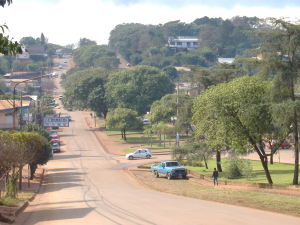 before | 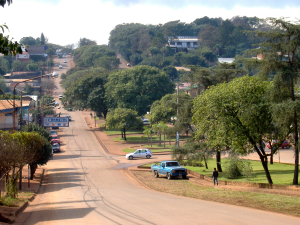 after |
You can even improve some pictures that look unsalvageable at first. This is Posadas, viewed across the Paraná on the bus returning from Encarnación, at the highest zoom level, on a rainy day:
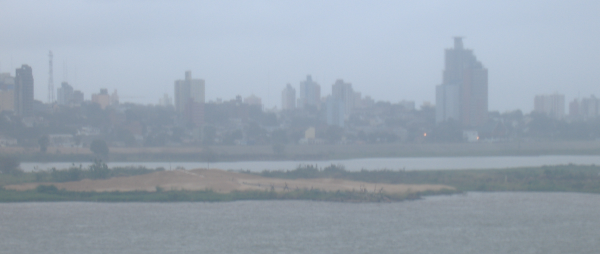 before |
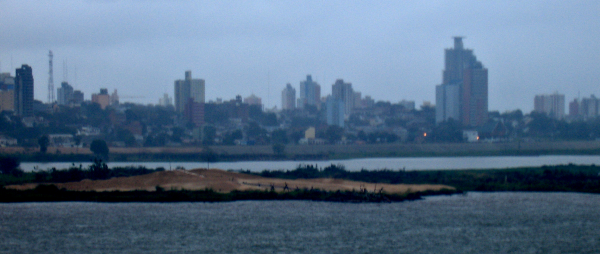 after |
There's more of this kind of stuff where that came from, so stay tuned.
29 August 2007
Return of the train
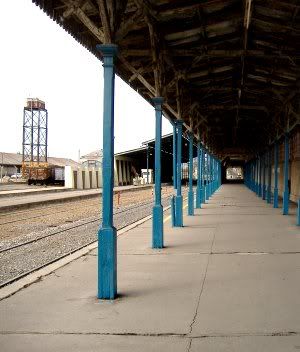
There's currently a weekly train service between Rosario Norte Station and Retiro, operated by Trenes de Buenos Aires (TBA). I've never seen it (not strange, given its frequency) but I've been told it's not only slow (7 hours to do 300 km) but also not in good condition, and rather dirty. However, a ticket is only AR$17 in "first class" (do note the quotes!) and thus extremely cheap, compared to the luxurious, fast, comfortable, but pricey bus services given by a number of companies, notably the AR$39 service of El Rosarino.
The national government has just bought a convoy from Spain, as part of the National Railway Recovery Plan (sounds like a good plan, but this is the first time I've ever heard of it, so it mustn't be doing lots of things around here — how odd is that!). Starting in mid-September, it'll be doing the Rosario–Buenos Aires route daily. It's a three-coach train with a diesel locomotive, with a capacity of 228 passengers. It has air conditioning and reclining seats. Since the railways are not well-maintained outside Buenos Aires, after Zárate (they're prepared for cargo traffic only), the train can only reach its maximum speed of 120 km/h within a small segment of the route, and the trip will take about 6 hours (depart from Rosario at 6 AM, reach Retiro at noon, depart from there at 6:30 PM and return to Rosario Norte around midnight).
Six hours in a luxury train seems fine to me. Quite logically the ticket "will be raised somewhat", according to the diplomatic language of TBA's authorities. Considering, however, that the bus ticket will go up soon as well (to AR$44 pesos as announced), and that the train is much safer and more comfortable (and romantic, if you're into that), the price would have to triple in order not to be attractive and competitive.
I'm looking forward to travelling on this train, as I last did when I was a child, in better times.
Labels: Argentine railways, buenos aires, rosario, train station, trains, travel
28 August 2007
Photographers' plague, part 2
On Sunday I marched again to gather with a different group of people... mostly friends and acquaintances of a friend of mine, who, coincidentally, were mostly photographers. I was digital, they were analog, but that was it. (I must note that, depending on to the people involved, a digital vs. film discussion may or may not become a religious war.)
We were supposed to gather at the door of the Club Mitre, or Club de Pescadores (Fishermen's Club), which is located on the... I can't call that a beach... let's say at the foot of the ravine of the Paraná River. You come from the city center down Corrientes St., and after passing the Rosario Central Station you are in the Parque de España. There are an elevator and a staircase which take you closer to the water level, where you'll find, on one side, a simple restaurant specialized in local fish, and on the other, an outdoor space with tables, chairs, and asadores with parrillas (that's barbecue platforms with grills).
If you want to eat at the restaurant, you don't pay anything to enter the club, and you can have (for example) a boga for two for 30 pesos, or a parrillada (good for one young male or two non-voracious females, according to the lady in charge) for AR$18.50. If you prefer to use the other facilities, you pay 4 pesos to enter, and you must bring your own food and whatever you're going to use in order to cook it and eat it.
When I showed up, at 11 AM, there were a group of people, some toting humongous cameras, but no sign of my friend. She came a bit later, and together with another friend of mine went to the supermarket to get some hamburgers, bread, tomatoes, lettuce, mayonnaise, and ketchup. That was to be our lunch. It took longer than I expected for such simple arrangements, mainly because there was almost no dry wood and old newspapers to help kindle the fire.
More people came, some went away. It was a peaceful afternoon, which I needed badly. I took pictures... nothing fancy, some of the people, to document the event, and some of the very nice view of the river, and a couple of ship-spotting pictures as well (I saw a LNG carrier!).
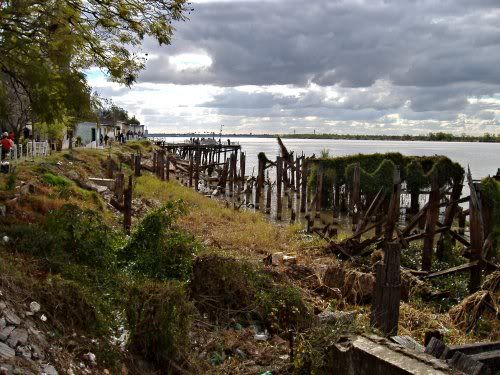 The morning was a bit cold, but sunny. The afternoon alternated between sunny and freezing, following the cloud cover.
The morning was a bit cold, but sunny. The afternoon alternated between sunny and freezing, following the cloud cover.We left the club at about 5 PM, and went to see a collective photo exhibition at the Centro de Expresiones Contemporáneas (CEC), which is a group of former port storehouses appropriated by the municipal government and refurbished to serve as a culture center (mainly for low-budget things, fan conventions like Leyendas, and non-massive rock concerts). The pictures on display were 25% good, 50% just (or barely) nice to look at, 25% too artsy or "conceptual" for their own good. We left the CEC as the sun went down.
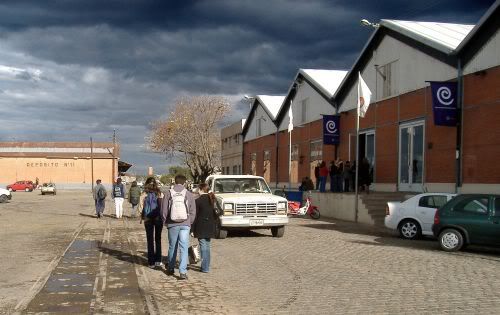
27 August 2007
Photographers' plague, part 1
Last Saturday was the monthly meeting/safari of the Rosarigasinos photographers' group (pictures?). I think there were about 20 of us this time. It was held in Granadero Baigorria, a city of 45,000 located just north of Rosario, in what a porteño would call el conurbano. We decided on it because it was nearby and there are several baigorrienses in our group. Like a dreadful swarm we descended upon a number of significant spots in the city, including a famed restaurant where we consumed a most welcome pasta lunch. The day was extremely cold and windy. The sun didn't come out from behind the clouds. Much merriment was had, and abundant photo-picturing was achieved, nevertheless.
Our main destination was the natural reserve. Saying it was neglected would be an understatement, unless by "natural" you mean "forgotten by mankind". Despite the garbage and the lack of care, it's a nice little place by the river. Some time ago large numbers of dead fish started appearing in the banks of the Paraná; pollution was blamed, but it turned out that the cold is the real culprit. Persistently cold temperatures made the fish sick and lowered their natural defenses. This happens from time to time.
 | 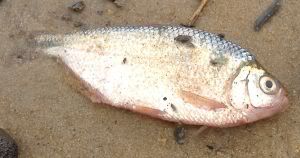 |
 | 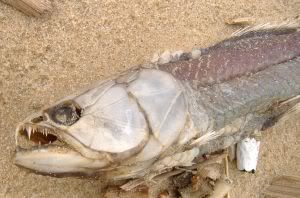 |
We invaded the train station and then toured the main square and took pictures of the church.
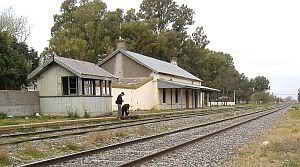
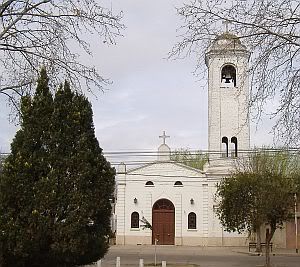
We also went to a replica of the Marian shrine of Schoenstatt. I don't really get what use it is to build a copy of a shrine (except as a tourist attraction). Sympathetic magic, maybe. Anyway, I reckon 25% of the group was agnostic or atheist, so this had more photographic and anthropological value than anything else. The shrine was nice enough (better ligthing would've helped).
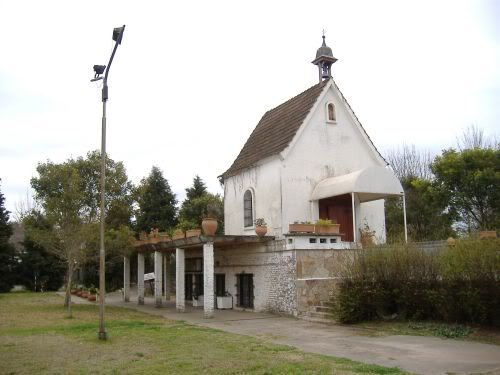
All in all, a great day and a great place. No major tourist attractions, just gems known to the locals, mostly.
If you're in Rosario, you can get to Granadero Baigorria easily: get out of the center through the Cruce Alberdi, go down Alberdi Ave., then the wide Rondeau Blvd., and then cross the municipal border under the Rosario–Victoria Bridge. That's it. The street changes its name to San Martín Ave., and goes on in a straight line. You'll see a collection of ugly buildings on your left: the Eva Perón Hospital. Keep driving and you'll be in Capitán Bermúdez, and then in Fray Luis Beltrán (these are smaller towns). After Beltrán is San Lorenzo, site of the only battle of the war of independence that was fought inside present-day national territory, and then Puerto General San Martín, and thus ends Greater Rosario.
The photographers' plague repeated itself, in slightly mutated form, the next day. I'll get to it tomorrow.
24 August 2007
You too can be a doctor
 From now on, aspiring students won't have to pass a test before entering the Faculty of Medicine of the National University of Rosario. The student center had been demanding this for ages. Now, what does it mean?
From now on, aspiring students won't have to pass a test before entering the Faculty of Medicine of the National University of Rosario. The student center had been demanding this for ages. Now, what does it mean?
The student centers of public universities in Argentina are all actually, and quite plainly, political movements. They're branches of well-known political parties, and they help recruit young members for them and gather people for demonstrations. For example, Franja Morada is a branch of the Radical Civic Union, which was born during the University Reform of 1918, and the MNR (which is currently the dominant movement in most faculties in Rosario) is a branch of the Socialist Party. As in all small and loosely regulated groups of this kind, the actual ideology is unimportant. The leaders stay on top by giving the other members what they want, which is done by organizing them and sending them to demand it before the authorities. The arguments used to support the demands need not be well-thought.
The issue of the entry exam was a casus belli for the university student movements. The exam was a filter. Before becoming a university student, the reasoning went, you should show you'd mastered basic concepts in highschool, and/or were prepared to invest time studying them now in your own time. In that way, you wouldn't be entering university-level classes without preparation.
The movements demanded that there was no exam invoking ideological reasons: the University Reform of 1918 revolutionized universities by advancing the idea that higher education should be public, free of charge, and free of restrictions, for everyone. (This acted as a great equalizer. Even today, despite the horrific state of education in Argentina, our universities continue producing fairly good professionals.) Thus, an exam that left you out of university before even starting it was a violation of the spirit of the Reform.
With the exam gone, everybody will be free to start studying. What's the problem with that? Well, the exam routinely filters out more than 50% of the aspiring students. Where will those extra students fit? Public university classrooms are already uncomfortably crowded, which works against the quality of teaching. Then also, those new students won't be among the brightest. Most will just be victims of a bad system that lets them graduate from highschool without knowing basic elements of basic subjects. But they'll slow down the rest — since the professors will have no choice but to go over what they should already know. You can't teach epidemiology without the basics of statistics, and you can't do statistics if you don't know math.
What does this mean for the political movements that pass for representatives of the student body? For starters, they'll have many more people to recruit from. Those people will be students who are having trouble keeping up with the rest, and they'll have even more incentive to give up study and protest more. (The leaders of university movements must be the worst students. They manage to stay in university until they're over 30 by presenting to one or two exams per year, so as to prolong their course indefinitely. You can't formally be a student leader and have a place in the government of the university if you're not a student.)
The answer is, of course, to have better education in the lower levels, and to show students the alternatives. There are too many doctors and too few nurses, for example. And there should be entry exams in all critical careers. Call me an elitist, but (provided there's a chance) I don't want anybody who isn't the best of the best to handle my health and my life.
22 August 2007
Nacho Suriani
The journalist Ignacio Nacho Suriani died of a heart failure today. This is not going to make headlines anywhere but here, but I'm sure almost everybody in Rosario with the absolute minimum exposure to the news already knows Nacho is gone, much as it happened when Roberto Fontanarrosa passed away last month. (Each person walking into my office begins by anxiously asking, "Do you know already...?")
Suriani was 73 (he was turning 74 next Saturday) and, for decades, he'd been doing a daily radio show called Tempranísimo on Radio 2, from 6 to 9 AM. Many of us have, at one point or other in our lives, had breakfast before school, college or work listening to his raspy voice, to his feigned old-fashioned, "macho lady-killer"-type reflections on women (he called himself a feminist), to both the taunts and compliments he joyfully directed at his co-hostess Mirta Andrín, to the measured verbal attacks he used in conversations with politicians and the rest of the assorted scum of the city.
I can't say he was a good journalist (who's to say?), but he sure was something you couldn't miss. He was a part of the urban landscape, something we were accustomed to, even myself (I'm not a radio listener; I just want some voice to talk to me while I have breakfast), and his absense will be noted. Three hours in the morning without that familiar voice is too much.
In the media:
21 August 2007
Archaeological leftist remains
I started to make this into a post for Vista Rosario, but soon I was giving explanations to the reader, and I somehow guess that VR's followers (who are increasing) don't want the kind of thing that is clogging the gutters of today's political discourse. The images are current, and illustrative, and it doesn't matter that they show a form of urban decay — but they represent a kind of decay that I don't want to showcase there. So here it is. It's a couple of posters that the most leftest of the left came up with, and pasted everywhere.
One poster calls the people not to vote for anybody...
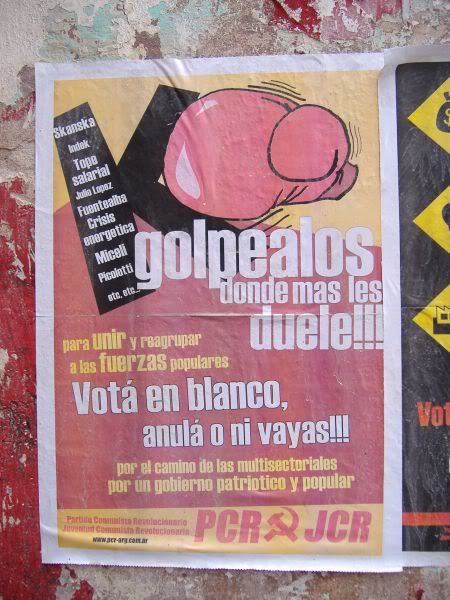
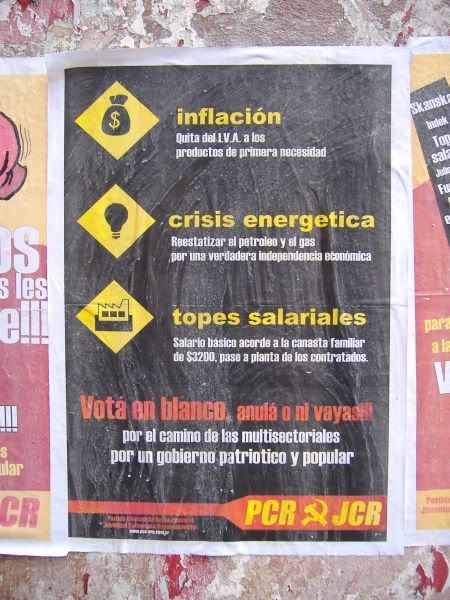
The text of the first poster (or rather, the parts that matter), includes a list of political scandals surrounding the national administration, and other things that bother us. The main text (next to the big red fist) says "Hit'em where it hurts them most", and below that, "Vote blank, void the ballot or just don't go". The first method means simply inserting an empty envelope into the ballot box, instead of an envelope with a ballot inside; the second means spoiling the ballot to force the authorities to discount it; the third means not going to vote, either violating the law or traveling more than 500 km away from your legal address so as to be exempt from voting.
The second poster offers a list of solutions. How do you deal with inflation? Exempt basic goods from the IVA (Impuesto al Valor Agregado, i.e. the VAT). The energy crisis? Re-statize natural gas and oil to regain energy independence. The government's imposition of wage tops (prez sits down with complacent union bosses, who promise they won't ask for more)? Give all workers a basic salary (not exactly a minimum wage, but close) based on a "family basket" (the cost of the goods and services that an average family needs monthly) of 3,200 pesos, or, at today's rate, about 1,000 U.S. dollars.
Makes sense, right? Well, the answer is not that simple. The Argentine tax system is regressive. It taxes the poor proportionally more than the rich. The VAT, being a tax on consumption that few items escape, is extremely regressive — because everybody consumes, but the rich can save a part of their income, while the poor cannot. A progressive government that cares for the poor, as Kirchner's is supposed to be, should have taken off the VAT from bread, some vegetables and cereals, and possibly beef. The state has a fiscal surplus, and part of the revenue loss could be compensated by increasing the taxes on personal and corporate profits, or simply by fighting tax evasion. Instead of that, the government recently increased the minimum wage that gets you taxed, and called it "a measure of social inclusion". Social inclusion means you give the poor a chance to stop being poor. People who earn three times an average salary, by definition, are not poor, they're comfortable middle class at least.
Re-statizing gas and oil companies is simply not possible. They were sold by mere pennies, and now they're worth mega-jillions and their owners are not willing to sell. Can't blame them for that. It's not that they're bent on taking away our national energy sovereignty — they just see big profit. That, and they're friends of Kirchner. Do you think you can rule an oil-producing province without friends in the business?
The salary tops — well, the only way for workers to get paid good money is from them to fight for it. Many well-off people today in Argentina think that workers are getting uppity about their wages. Those people have grown accustomed to inequality. Thirty years ago, a factory worker could support his family alone and go on vacations with them every summer, and have his own house and a small car. Today, even in middle-class homes both parents have to work, and it's difficult for them to buy a nice house. Thirty years ago, however, the state systematically murdered those who could think for themselves, organize others and fight for their rights. Some fled. More than a few sold themselves out. And this is how we have, today, union leaders who have no qualms agreeing with the politicians in charge that they won't make their lives difficult and will only fight to keep the workers from starving, so the economy continues to march ahead as planned.
It's a pity that the Argentine left is so miserable. They have no idea what to do to get our attention and our votes. They have a point or two, but they're so laughable most of the time that they make you feel embarrassed.
Labels: 2007 campaign, argentine politics, election, pictures, the left
Extreme makeover
Needless to say (well... needless unless this is the first time you visit this blog) I've changed the layout and design of D for Disorientation. It's been more than a year already! I don't think it's the best possible design, but I don't have the time to write an entirely new style sheet and test it a thousand times, and Blogger doesn't offer many templates of the kind I wanted.
This layout does what every well-designed webpage layout should do: it stretches to cover the whole screen, instead of relying on fixed widths for each of its parts. It takes more effort to design, sure, but it doesn't restrict your content to flow inside a rigid 800-pixel-wide column. Most people now browse with a screen resolution of at least 1024×768. I now have plenty of space to post big, full-width pictures, and to illustrate paragraphs with smaller ones, and the side bar has extra room as well.
I've also added some words about me, and (gasp!) advertising, besides placing the PayPal donation button in a more visible spot. We'll see if that works. Although I don't do this for money and I don't really need to be paid to keep me babbling about myself, it sure helps on other fronts.
The "social network" buttons that allow visitors to bookmark, review and recommend this site are also easier to spot now. Do use them.
And that's it for now, since I haven't done anything in Real Life after what I reported yesterday. Damn Real Life.
20 August 2007
Kites, birthday party, roleplaying, asado
Quite a lot of things to report, so I'm doing it in order.
First, the kite festival seems to have been very interesting, only I wasn't there to enjoy it. As it turned out, the whole weekend was extremely cold and windy, quite possibly superb to fly kites, but not good for fragile humans. Since the festival's schedule said "Friday, Saturday and Sunday, starting 10 AM", I went to the Parque Scalabrini Ortiz on Saturday at about 11 AM hoping to find the festival raging. There were only a few people trying kites, setting up tents, and watching. The blue-ringed octopus was impressive, but there wasn't much to see apart from it.
When I was starting to leave, an hour later, someone announced over a loudspeaker that "in a few minutes" they'd be starting to open the festival, formally, with an exhibition of some sort. My head hurt and my nose was already a half-melted icicle, so I left. Saturday afternoon was overcast and I had to go out at night because it was my brother's birthday and he was going to celebrate it with pizza in a bar, so took an aspirin, a long siesta, and a very hot shower, in that order, thus regaining a measure of consciousness.
I couldn't go to the festival's last day either (you'll see why soon). So I only got to take a few pictures on Saturday morning, but one my photography mates was covering the event and took more than a hundred, so please check them out: 7º Festival Internacional de Barriletes.
Saturday night, I ate with my brother and his friends and a couple of mine, and the ones left after that went to another bar and had a cup of coffee. My friends and I then split and went for beer elsewhere. The last place was as crowded as it was warm, fortunately.
Sunday started at noon for me. Again it was very cold, but I had already arranged a roleplaying meeting. The place was new, though — the home of one my players, where none of us had gone before, in Granadero Baigorria, just outside Rosario. Easy enough to go by bus, but not nearly as advisable to return from at night in winter (both weather- and safety-wise). The house resembled, at parts, a cross of a junkyard with an untamed garden, plus living spaces with touches of several decades of the 20th century: alcohol burners, a collection of dark glass bottles and flasks, a lava lamp. Very interesting indeed.
 There was a dog too... a Giant Schnauzer, an adorable black-haired monster that alternatively amused and bothered us, tirelessly jumping around, trying to make us, cold humans, into one of his own. He had to be confined to a neighbouring room behind a couple of chairs to stop him from assaulting the asado we made in the evening. Dogs will be dogs!
There was a dog too... a Giant Schnauzer, an adorable black-haired monster that alternatively amused and bothered us, tirelessly jumping around, trying to make us, cold humans, into one of his own. He had to be confined to a neighbouring room behind a couple of chairs to stop him from assaulting the asado we made in the evening. Dogs will be dogs!The RPG session went fine. Our host's character was just entering the story and he made a good job of it as an older, experienced leader of men with a dark past, supposedly "retired" but actually under the command of powers beyond his comprehension. So far I've only prepared the characters for a more direct encounter with those powers, which they'll run into, violently, very soon. Mwa ha ha!
16 August 2007
Flaneurs benvinguts!
I had promised myself to go check a photo exhibition at the Centre Català that was noted by a fellow photographer. I don't recall ever entering the Centre before; it's a very nice but unremarkable little building on a pothole-ridden Entre Ríos St., right opposite the imponent and very dirty Faculty of Humanities and Art. My dad used to go there to sing in a choir. They have a small café, paintings, nice mosaics on the walls, and a warm Benvinguts ('Welcome') sign. They teach Catalan courses, which I have to try some day because I love how the language sounds. Anyway, the exhibition turned out to be a dozen black-and-white and colour pictures, some interesting, some rather plain. Nothing to go especially there for (is that a weird sentence or not?).
The topic, however, was intriguing. It was flâneur photography, a flâneur being a person that walks around the city to experience it (flâner means 'to stroll' in French). The definition excludes the common tourist and the professional photographer actively trying to get a particular shot, as well as the indifferent citizen. A note on the wall, next to the pictures, remarked that flâneurs are becoming a rare species, given how everybody goes from A to B as quickly as possible and often without a glance sideways, up, or down. I'm an active flâneur whenever I go, so this idea touched me more than the pictures.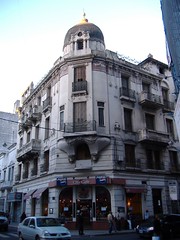 Being loyal to my newly-named passion, I strolled around a bit and took a few pictures. I'm always amazed at this city — I've been walking the downtown for 15 years and I still "discover" fantastic historical architecture every day just by paying attention. Then I caught a bus, and after a 15-minute ride I got off of it at the Patio de la Madera, where the Rosario Book Fair is being held.
Being loyal to my newly-named passion, I strolled around a bit and took a few pictures. I'm always amazed at this city — I've been walking the downtown for 15 years and I still "discover" fantastic historical architecture every day just by paying attention. Then I caught a bus, and after a 15-minute ride I got off of it at the Patio de la Madera, where the Rosario Book Fair is being held.
It was a bit better than last year, when I gave it an appalling review. The usual pseudoscience and Da Vinci Code-ish crap was restricted to a few specific spots; there was less fiction and more history books, as well as an inordinate amount of space for Marxist literature and, of course, many books by Roberto Fontanarrosa so that people who never knew who he was when he was alive can now buy them and show them off. Everything was terribly expensive, but that's how it usually is.
There was also a huge scale model of Santa Fe La Vieja, or Cayastá, the site of the first settlement of the city of Santa Fe, which had to be moved because, among other things, the nearby San Javier River had a tendency to eat away parts of the town. The provincial government is campaigning for Santa Fe La Vieja to be declared a World Heritage Site by UNESCO, which would mean funds for archaeological exploration and preservation.
My personal agenda for this weekend (agenda means 'schedule' or 'appointment book' in Spanish, being more faithful to the original Latin meaning '[things] to be done') is going to the Kite Festival at Scalabrini Ortiz Park, at least one day (it's a Fri-Sat-Sun event). I'll be there for the pictures only... I think haven't flown a kite in 20 years. Recurrent attenders have recommended it highly; there'll be fireworks, model aircraft, and even rokkaku kite (六角凧) fights.
It's a long weekend, since the holiday of August 17, honouring José de San Martín, is moved to Monday, August 20. So I'll have Sunday for roleplaying (if all of my players are healthy — one was attacked by a fierce Mycoplasma last week!), and Monday... we'll see.
Labels: book fair, flaneur, kites, long weekend, personal, photography
14 August 2007
Campaign daze
There are so many ways to go about a political campaign! If you're the government, that's made easy by the fact that you can unveil public works and you can do it at the exact moment you want. If they actually serve a useful purpose, better yet.
This the Arturo Illia Tunnel on Monday, August 13:
This is the same tunnel on Tuesday, August 14 (the time of the day is about the same, but the lighting and the exposure are different):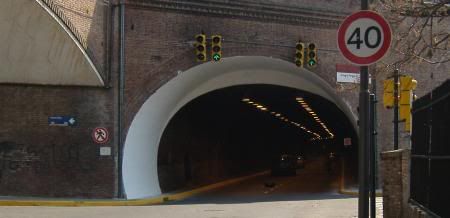
The municipality changed the lighting system of the tunnel: they took out the fluorescent lights on both sides, and installed a double row of zenital cut-off sodium lamps, "for power efficiency and safety". So far, so good. Only the mayor Miguel Lifschitz, went there to inaugurate the lights. It was a lot of work, I get it, but I don't get a will-never-be-the-same feeling from the change. Lifschitz is campaigning for his reelection, though — which explains why he not only mounted a show to unveil the lights at a scheduled event on Tuesday although they were basically ready on Monday, but also why he's also unveiling a level crossing on a very minor street in a forgotten spot of the city tomorrow, and advertising it with pamphlets carrying the internationally recognizable symbol of the rose in the fist.
In his defense, I may say these things are actually useful, and they're working already. Other government authorities have a tendency to unveil things that are not complete, or worse, to gather thousands of people just to announce future works, which may or may not be impossible to do. Think the Rosario-Buenos Aires "bullet train", which I still refuse to dismiss as pure fantasy, but also remember how Carlos Menem infamously promised we'd have an airport for "stratospheric planes", and how he "unveiled" the Rosario–Victoria Bridge four years before it was completed. Another way of going about your campaign if you're in the government is, of course, giving away money to public employees. This is even more useful if you avert a possible teachers' strike, and need not cost a lot. In the case of the Province of Santa Fe, less than 100 dollars per employee, one payment only, and lest someone think this is an electoral measure, it will be done after the elections (it's announced now so that people can adjust their monthly budgets, surely, and because nobody likes a surprise raise... I guess?).
Another way of going about your campaign if you're in the government is, of course, giving away money to public employees. This is even more useful if you avert a possible teachers' strike, and need not cost a lot. In the case of the Province of Santa Fe, less than 100 dollars per employee, one payment only, and lest someone think this is an electoral measure, it will be done after the elections (it's announced now so that people can adjust their monthly budgets, surely, and because nobody likes a surprise raise... I guess?).
13 August 2007
Discrimination in Rosario
Unsurprising, but still terrible: more than half of the teenagers in Rosario felt discriminated at least once in their lives, and 84% say they witnessed others being discriminated. The preferred places for discrimination are everywhere, but the typical one is the entrance to the disco. The causes: overall physique, skin colour, being overweight, being (looking) poor or low-class... This is the result of a survey conducted in 15 schools.
Argentine society has become less and less egalitarian over the years. Class differences are more marked, and they're reinforced by physical stereotypes. In the large cities, being poor, having dark complexion, and speaking with an accent that is not mainstream Rioplatense, are often correlated. On the other hand, even though political correctness has made progress in our society, mocking other people because they're fat or effeminate or have aboriginal-looking features is still socially acceptable in many circles, as is oblivious talk of racial stereotypes as fact. The kids know this, and they're part of this — they both suffer from it and suffer it to continue.
I guess this is probably worse than in my time. I can't recall being discriminated, despite the fact that I have a complexion that is darker than average and (in my teenage years) carelessly adopted a look that makes me cringe whenever I revisit old photo albums. It was a phase.
Quite ridiculously, I did feel discriminated much more recently, once I went to a certain disco. They said I was too old — it was for people up to 25. Never mind this very same disco had refused to allow entrance (weeks before) to a couple of friends of mine who happened to be 24 at the time, because they were too young. I got the impression I was rejected because my shaggy general appearance diminished the disco's public status. Since I'd been more or less dragged to the place, I wasn't dressed for the occasion; but since I was going to pay a nice sum of $$$ to enter a dark room without proper security measures where I was to be trampled upon by hundreds of drunkards and subject to crappy music, only to get out a couple of hours afterward stinking of smoke of cigarettes I don't smoke, pushed by steroid-crazed pumped-up guards, I thought they were not treating me, the customer, as I deserved. I couldn't care less, really, but I got angry on principle.
Inevitably, one's environment changes one's ideas. I consciously try not to discriminate, but that's much easier when you don't feel your security threatened. Most of the "insecurity" broadcast by the media is pure sensationalistic crap; and of course, while a petty thief might take your wallet or your leather jacket, top government officials are moving around millions in illegal business and literally taking away your country and fortune... but the prey's acquired reflexes are difficult to suppress. I have avoided people in the street because of how they look, despite the fact they were most probably common folks who happened to be poor and understandably not happy about their condition. This is, sadly, what we've come to.
Labels: argentine society, classism, discrimination, racism, rosario
10 August 2007
Quis custodiet custodes?
The elections in Santa Fe are in three weeks. In the primaries, the opposition candidate Hermes Binner got about 2% less votes than the two ruling party candidates combined... but those were provisional numbers. Two weeks after that, the final count gave 15,000 more votes to Binner. The Peronist candidates added a few thousands as well, but the distance decreased significantly. Binner said "I want international overseers from OAS." The provincial government sneered at it: "We don't know why he's so uptight about transparency, but we'll get those overseers." So far, so far good.
Yet Government Minister Roberto Rosúa now says there's no need to bother OAS with a request of international overseers for the main elections, and proposes, instead, that we employ overseers provided by CIPPEC, a national NGO which I have nothing bad to say about a priori... except it's recommended by national Interior Minister Aníbal Fernández (that would be the Luiggi to Alberto Fernández's Mario). Fernández, I don't know why, seems to have power to decide over the transparency controls of the elections.
Not only that, but we learn that members of the provincial police force vote in special double envelopes, and those votes are not counted in the provisional tally. That's because of the special circumstances in which the police have to vote (they're on duty during the election, maybe guarding places far away from their legal addresses, etc.). Fine. Except there are 6,000 policemen in Santa Fe. That's 6,000 employees of the provincial administration, and that's also 6,000 votes that may suddenly pop out of nowhere if needed, after the polls are closed. We're talking of a party that doesn't like to lose, that hasn't lost an election in 24 years, that has people in every place where it may need them to avert a defeat, and that has a lot, a lot to lose. The ones who have to control the elections and the vote count are employees of this government, members of this party, and people recommended by a notorious member of the party.
Quis, indeed.
Labels: 2007 campaign, argentine politics, election, government, police, santa fe
09 August 2007
Advertising on a trip

My reading: If you buy stuff from us, you may win a bike! The bunny on steroids will bring it to you in front of your school, so you can show it off to your friends. Unless the bunny scares the hell out of them.
I don't deal with funny ads, or even with pictures in general, in this blog (I do try to bring to you some artistic pictures at Vista Rosario — which you should visit, by the way — I mean every day). But this really freaked me out. The Argentine advertising industry is known internationally for its quality, but when a blunder is to be made, it will be a blunder like none other.
08 August 2007
Paradise
 Chief of Cabinet Alberto Fernández (picture on the right) says we (the people of Argentina) are "at the gates of Paradise". This is great progress indeed, as 9 months ago we were in Purgatory, and merely two and a half years ago we were still in hell. We've taken longer than Dante, who did the whole tour in three days, but then we're 35 million people, not a lone Italian guy, so the logistics were much more complicated.
Chief of Cabinet Alberto Fernández (picture on the right) says we (the people of Argentina) are "at the gates of Paradise". This is great progress indeed, as 9 months ago we were in Purgatory, and merely two and a half years ago we were still in hell. We've taken longer than Dante, who did the whole tour in three days, but then we're 35 million people, not a lone Italian guy, so the logistics were much more complicated.
Being where we are has some drawbacks. First of all, hell was much warmer. Amid the Molotov-fed flames, polar cold fronts were a fantasy, and so were these sad times, when nothing is left to discuss because we've found the One Really Unbreakable Economic Model. Thus solving the problem once and for all!
Also, back then we didn't have an energy crisis growth problem, because hell, as you know, is hotter in some places than in others, and this temperature differential allows for the extraction of energy from hellspace itself (this is believed to be caused by the continuous expansion of hell due to the so-called satanical constant, which is a form of dark energy; it's needed to accommodate newcomers). Paradise being a place of unchanging, perfect beatitude, it's bound to be in thermodynamic equilibrium, and therefore not only boring, but unable to support the accelerated GDP growth that has been feeding us all since 2003.
Our productive system may be able to sustain itself on hot air for some time (new reserves are being found all the time!), but probably no longer than one presidential period.
Heaven help us.
06 August 2007
Roleplaying on a Sunday afternoon
First roleplaying session yesterday, after a long time, was quite OK. I'd say a success, but that would sound prideful, as it was me who directed the thing, and it's the players who should say, at the fullness of time... There were four of us, counting myself, two friends and a guy who used to work in my office. We stayed in contact and, when I learned he was an active roleplayer, I invited him over. Three players are enough, but not plenty; if someone cannot make it to one session, you have to cancel, since it's a bother to direct only two players. That's for me, at least. The new guy was to bring along another player, but she couldn't make it this time.
The game is World of Darkness, the players play regular human characters (for now!), and the setting is present-day Rosario (with a couple of supernatural touches, obviously). This is the second time I use this setting, and I'm re-using some of my previous notes, but the characters are all new. I find it easier to play this way, and the sense of familiarity with the surroundings allows the players to move more naturally than if I were to stage the game in, say, New York or London or an unspecified Gotham-like city, as others do. With everybody pinned down on the real map of Rosario, we all know (and need not argue over) how much time it takes to go from character A's house in the suburbs to character B's downtown apartment.
I'm not really into roleplaying activism, but I do believe it's a good pastime. In some cases it may be a form of improvisation theatre, and it sure is relaxing, when all goes well. (There are many, many ways in which it may go horribly wrong, but you can see them coming.) So try it if you can.
And, since we're at it, I'll recommend a website... It's a group of RPG fans who try to raise awareness of this hobby, which is still unknown to many in Argentina, and viewed as strange by others, and organize game sessions in events such as Leyendas and (recently) Cinecomix. (My brother is in the group.) They're called Sierpes del Sur and they've just opened up a forum. It's all in Spanish, but there's a chance some of my bilingual readers may find it useful.
03 August 2007
Rosario City
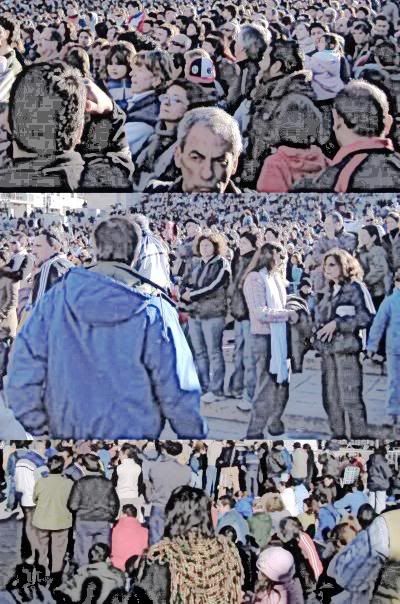
Rosario has no foundation date, and no founder. Somebody just got the lands and settled here and somehow, slowly, a village grew. But the city of Rosario does have a birthday... although it's not clear when. On 3 August 1852 the town council decided to proclaim it a city; on 5 August the governor made it official. If we accept the latter date, then we can say tomorrow Rosario City is 155 years old. But nobody seems to remember the date, or care about it.
We celebrate the day of the Virgin of the Rosary on 7 October, which I half agree with because it was around the chapel of the virgin that the town was established and got its name from, but then that was ages ago and of course every Spanish town in the Americas started like that — a main square or plaza surrounded by the seats of secular and religious power, the town hall and the church, all of it often called Villa de Nuestra Señora de Whatever.
There was some official recognition of the date, I seem to recall, in 2002, when the city turned 150, but not this year. There should be. Rosario was not simply proclaimed a city when some politician had nothing better to do and signed a declaration to that effect, or when it reached a certain population through natural growth. Rosario was a large village or town in the second quarter of the 19th century, and it was supposed to be much more than that, but in 1841 Juan Manuel de Rosas, the caudillo/dictator/governor of Buenos Aires, decided that he wanted all overseas traffic for his own place and forbade foreign trade ships to go up the Paraná River. In 1852, however, the caudillo of Entre Ríos, Justo José de Urquiza, got tired and rebelled against Rosas, and the people of Rosario supported him. Once in power, Urquiza, who had a good eye for business, opened up the traffic again, and granted Rosario the title of city. It was a good move and it was what the city needed — the port starting working like crazy, and the population went from about 3,000 to more than 50,000 in less than 40 years.
Well, many of the good things that enter Argentina still end up staying in Buenos Aires, from tourism to electronics, but today no dictator can shut us off from down there.
Cold, dark winter
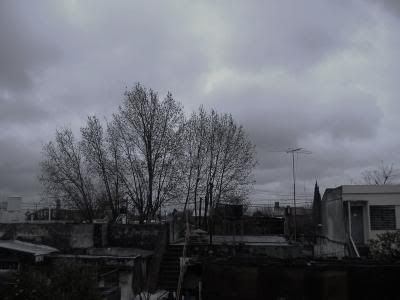 I'm quickly running out of interesting things to do here at home. But I just can't go outside. Not unless I have to. It's raining, it's windy, and it feels very, very cold. I'm just back from a common cold and I don't want to catch another one, common or worse. And sometimes the feeling is painfully cold. I'm a skinny guy — I don't have a thick layer of subcutaneous fat to insulate myself. And I don't have a bar of strong drinks at home, at my disposal. Why can't I be a fat drunk, happily oblivious to the polar wave?
I'm quickly running out of interesting things to do here at home. But I just can't go outside. Not unless I have to. It's raining, it's windy, and it feels very, very cold. I'm just back from a common cold and I don't want to catch another one, common or worse. And sometimes the feeling is painfully cold. I'm a skinny guy — I don't have a thick layer of subcutaneous fat to insulate myself. And I don't have a bar of strong drinks at home, at my disposal. Why can't I be a fat drunk, happily oblivious to the polar wave?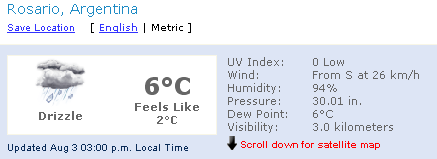 I've moved Vista Rosario, as I announced, and I've been working a lot on it. I've had a lot of time. I've been checking pictures from last year, and discovered a few gems among them, such as several historical buildings whose pictures I took, at the time, because "they looked so cool" (I guess). Most of the pictures are "burned" on one side, or too dark because I didn't care about the lack of sunlight, or simply not well composed, but some are just fine. Add some Gimp-powered tampering, and voilà.
I've moved Vista Rosario, as I announced, and I've been working a lot on it. I've had a lot of time. I've been checking pictures from last year, and discovered a few gems among them, such as several historical buildings whose pictures I took, at the time, because "they looked so cool" (I guess). Most of the pictures are "burned" on one side, or too dark because I didn't care about the lack of sunlight, or simply not well composed, but some are just fine. Add some Gimp-powered tampering, and voilà.
(By the way, do check out Vista Rosario, link to it, mark it as a favorite Technorati blog, StumbleUpon it, etc. It helps. If I don't promote myself, who will? Exactly.)
I've also been reading Douglas Hofstadter's Gödel, Escher, Bach, which is a very fine book, except you need to take it in small doses or your brains will be splattered on the walls. It's about self-reference in fields such as mathematics and logic, though also in other places, such as Johann Sebastian Bach's fugues. A fugue is a piece of music composed of a basic theme repeated over itself in different scales, speeds, and even directions, and Bach was a master at them. I don't dislike math or logic, and I'm just an amateur at music, but it's actually far more entertaining for me to read about Bach's incredible skills than about Gödel's Theorem.
I did not go to see the Simpsons movie, and I think I won't. I'm a huge fan of The Simpsons; I grew up with them and I can pull out Homer's quotes about all sorts of situations in a second... in the Latin American Spanish version, of course. I didn't like how they changed the voices because the Mexican dubbers were asking for a salary raise, but I could live with it. But I couldn't stand by the series when Matt Groening left and it degraded into badly executed fake intellectual comedy. Homer was a nice fool, now he's just stupid, incoherent, and nasty; the kids simply have no character anymore, and the newer episodes usually don't manage to make me laugh — something the old series achieved every ten seconds during whole episodes.
So keeping the good things for the movie while we, the loyal TV followers, are left with the trash, is not OK with me. From what I've heard, the movie is just an overproduced long episode. I'm not going to pay for that. (Maybe when I'm old and President of the Supreme Court, I will allow myself to watch it.)
In short, I think no movies and no strong drinks will make Pablo go crazy. I should go back to my old pictures...
Labels: blogging, book review, cold weather, film review, personal, photography, the simpsons
02 August 2007
Haunted swing
I had many news (bad news) to report on but I thought this could cheer you people up, as well as being a good chance to laugh at the whole subject. This must be the spookiest paranormal phenomenon you've ever witnessed: a swing that swings itself!
I'm always amazed of the ways people find to make their lives more interesting. I photograph things; I even go to places to photograph specific things. I read books about subjects I don't quite understand or can barely grasp. I'm learning a language where everything seems to be upside down relative to my native tongue. Other people do stranger things to get their "fix", like jumping off bridges with a rope tied to their ankles, or smoking mushrooms, or praying. But getting yourself to believe there's a swing that moves by itself must be among the most ridiculous ways to spice up your earthly life.
Some people in Firmat, a town southwest of Rosario, believe there's a swing that moves by itself. No, before you laugh at it, it's not the wind, and just in case, the other two swings in the same set aren't moving. The movement of the swing is pronounced, and it really doesn't look abnormal — the chain that holds it is not tensed or fully extended, so there's no invisible child sitting on it, and the balance is steady and shows the homogeneous deceleration that is to be expected in a simple gravity pendulum, only it regains acceleration every now and then and so continues to swing for a while (the video is not clear at all).
I'm not going to judge the simple-minded folks who believe a swing can move by itself. There are probably many people in Firmat who'd swear they see the swing moving without any force being exerted over it by natural means. I don't think it's a conspiracy to distract attention from something else. I can't really discard it as a joke. So?
So, which of these two possibilities is more likely to be true?
- The swing really moves by itself or through undetectable means outside the limits of human science and common experience.
- Somebody outside the camera's field of view is pulling the swing with a string.
People are already claiming the spirit of a child is swinging in the swing, and some say they've talked to the swing (that must have been a truly weird experience). The mayor of Firmat only said "We can't find a rational explanation", and, rather disappointedly, noted that he'd like journalists and curious visitors to come to his town for different reasons. (Maybe the ghost in the swing will take his cue from that.)
Labels: firmat, gullibility, paranormal phenomena, santa fe, swing
01 August 2007
Vista Rosario moves
I've just finished moving my photoblog about Rosario, Vista Rosario, to WordPress. It really is much better than Blogger in most respects. I don't intend to move D for Disorientation, since it'd be a lot of work (the "import" feature provided by WordPress is very good, but not perfect). Please, if you follow Vista Rosario, update your links.
And if you don't know Vista Rosario, please, check it out. It's mostly in Spanish, but most of the meaning should be found in the pictures...

